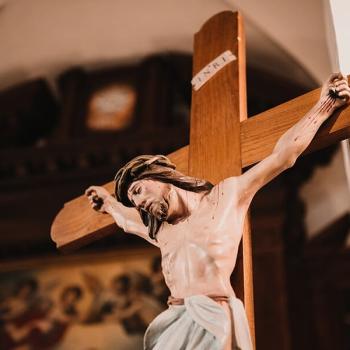 A Meditation on the Gospel for Advent One: Luke 21:25-36
A Meditation on the Gospel for Advent One: Luke 21:25-36
“You get to your destination twice as fast.”
I overhear a man on a phone telling someone this. Speed is a good thing, I suppose, if you don’t want to be where you are.
How can I forget—I can’t, I will never forget—the hurried, weary pastor I met at a Christmas Eve dinner. “It’s such a holy time,” she said of Advent. “I can’t wait ‘til it’s over.”
She left the dinner table earlier than the rest of the guests, to go prepare the way of the Lord, that is, to unlock the church and make sure there would be enough worship bulletins and candles to hand to the coming, expectant multitude at midnight. The candlelit “Silent Night” tradition, all waxen and melting, would culminate the sacred season. The people who had felt hustled most of the month, having now rushed to church to get decent seats, would see the great light they held in their own hands. They would join their voices in a rising, moaning O. And a calm the duration of a carol would overcome them.
Here at Advent’s beginning, can you wait ‘til it’s over? Can you weather December at the pace at which the sun burns, the moon shines, and the stars brightly evolve—no faster? Let heaven’s everyday lights illuminate the world for you. They will burnish your face and make you glow like an acolyte at the altar.
Stop moving for a change. Stand up and raise your head. Know the kingdom of God to be near but not here, not fully, not yet. Consider Advent a borderland between heaven and earth, the limbus of logos and flesh.
“Take care of yourself,” says the man on the phone, then nearly whispers, by way of goodbye, “Me too you.”
When will he see in the flesh the faraway one who called? Is love a destination to be rushed-to twice as fast? A longing to be savored?
“We love you without any gifts,” my sister-in-law texted me. I had asked what her son wants for Christmas.
Imagine this Advent: a darkening month of unhurried days that won’t pass away until the world gets for Christmas the redemption that faces the whole earth.
This Advent, unlock your prayers. Let in a shaken multitude seeking shelter, clarity, and cheer. Offer them the bulletins and candles that comprise your midnight faith. Keep vigil, unmoved as a tree. Notice clouds overhead and announce to the distressed earth whose arrival they portend. One who loves us without any gifts is coming. You will bear witness to his advent if you aren’t worry-drunk and don’t squander your attentions on this generation’s histrionics. Go easy on the spirits this month—on all the stupefying pastimes that let luminous reality bypass us unobserved.
Unburden your heart. Station yourself under the sky, near the water, in a grove, by a road pilgrims take (if but once a year) on their way to a gathering place where people burn holes in the gloom, singing into their handheld fires. Let their song infuse and prepare you for one year’s noisy demise and another’s startled beginning. Stand by. Monitor the highway. Wave your slow yellow flag to alert approaching souls: Caution. Oncoming Glory.
 Rachel M. Srubas is the author of Oblation: Meditations on St. Benedict’s Rule (Paraclete Press, 2006), City of Prayer: Forty Days with Desert Christians (Liturgical Press, 2008), and The Girl Got Up: A Cruciform Memoir (forthcoming, Liturgical Press, 2013). Her poems and essays have appeared in The Best American Poetry, The Christian Century, Weavings, The Journal of Feminist Studies in Religion andGive Us This Day, among other publications. Much of Rachel’s writing emerges from her practice of lectio divina and her experience of the Word as living and active.
Rachel M. Srubas is the author of Oblation: Meditations on St. Benedict’s Rule (Paraclete Press, 2006), City of Prayer: Forty Days with Desert Christians (Liturgical Press, 2008), and The Girl Got Up: A Cruciform Memoir (forthcoming, Liturgical Press, 2013). Her poems and essays have appeared in The Best American Poetry, The Christian Century, Weavings, The Journal of Feminist Studies in Religion andGive Us This Day, among other publications. Much of Rachel’s writing emerges from her practice of lectio divina and her experience of the Word as living and active.
Baptized at 23 in the late 1980s, Rachel is the solo pastor of Mountain Shadows Presbyterian Church (USA) in Tucson, Arizona. She also teaches on the faculty of the Hesychia School of Spiritual Direction and serves as the spiritual director for religious leaders of varying faith traditions.

















